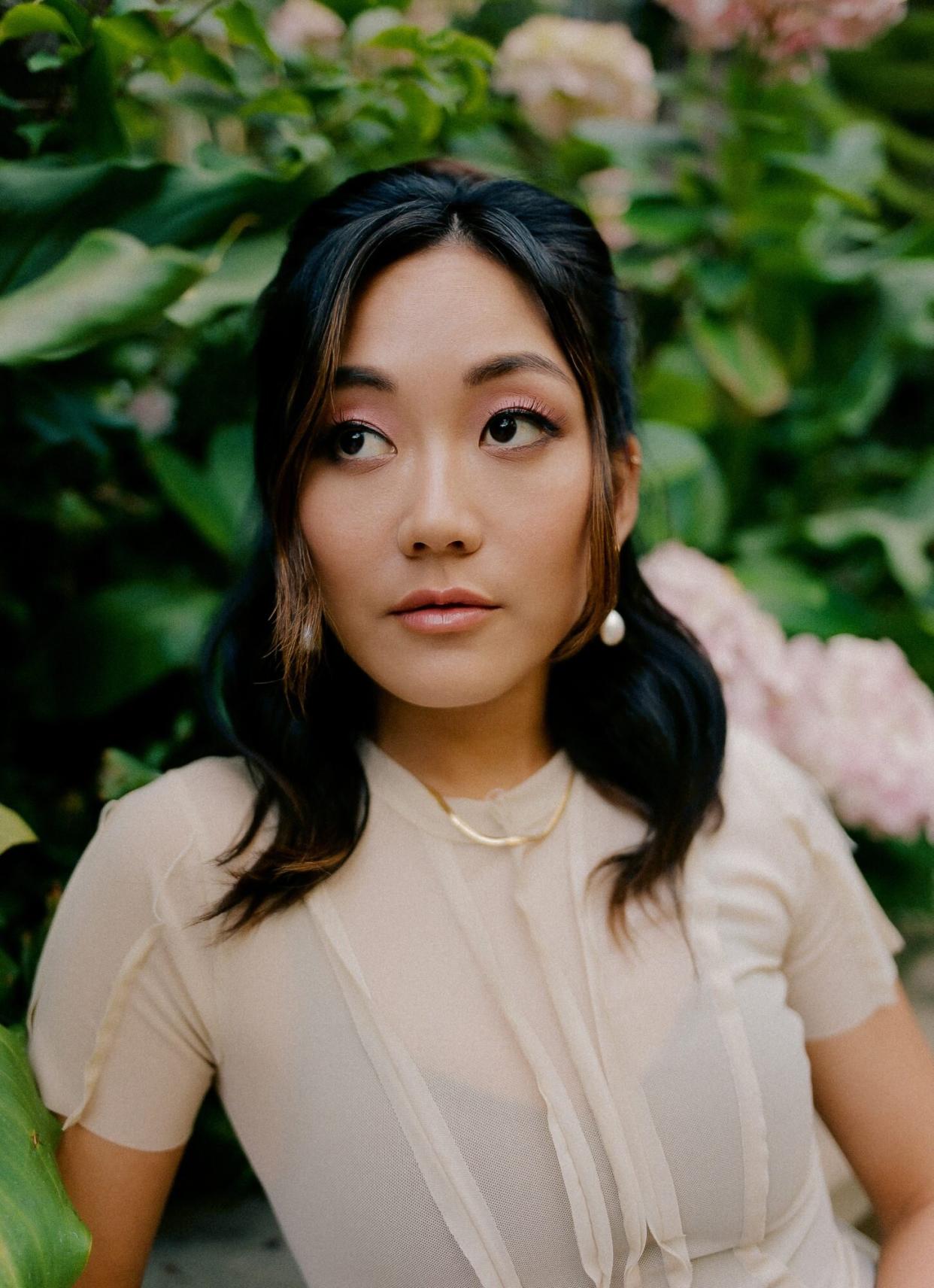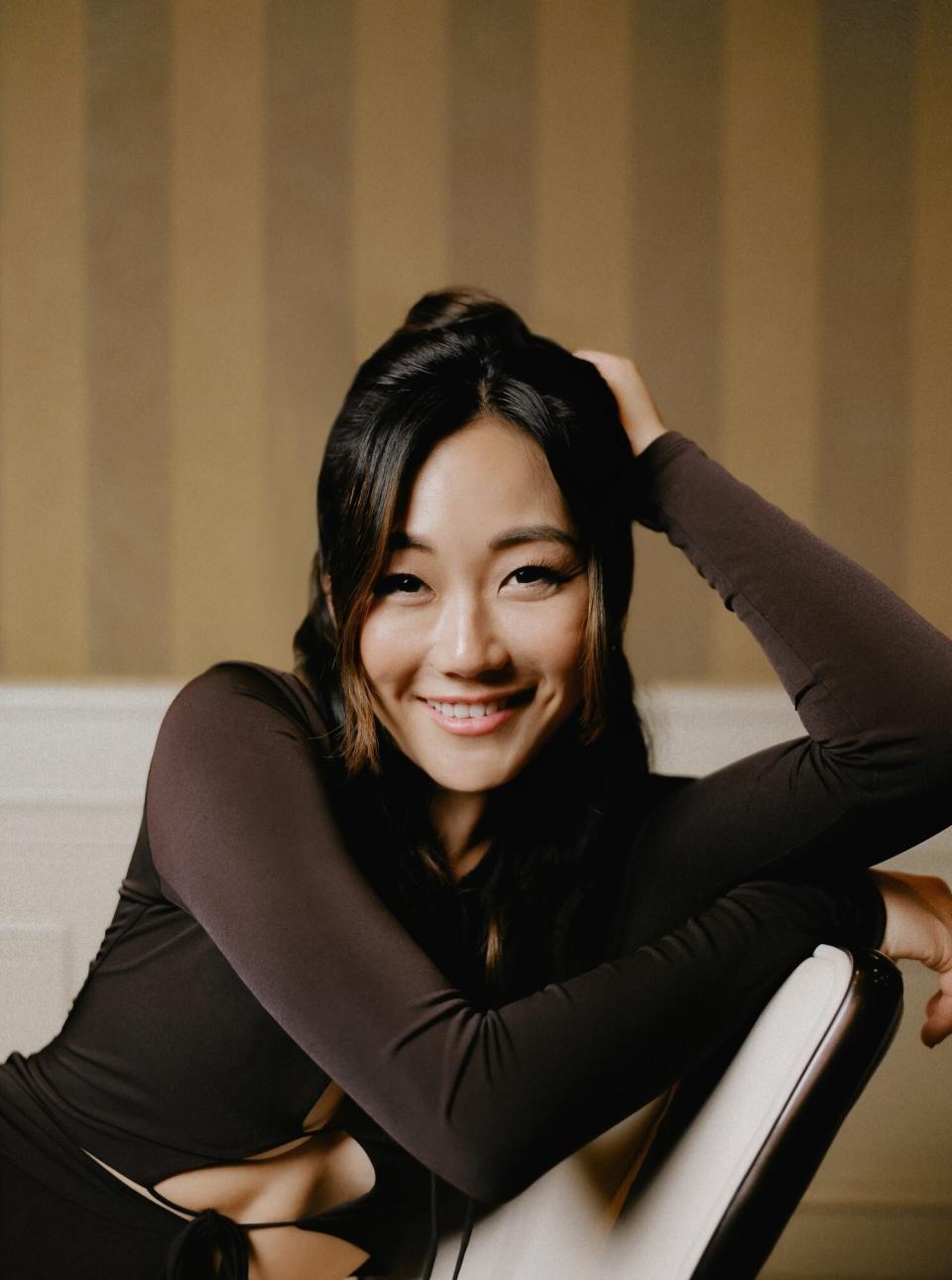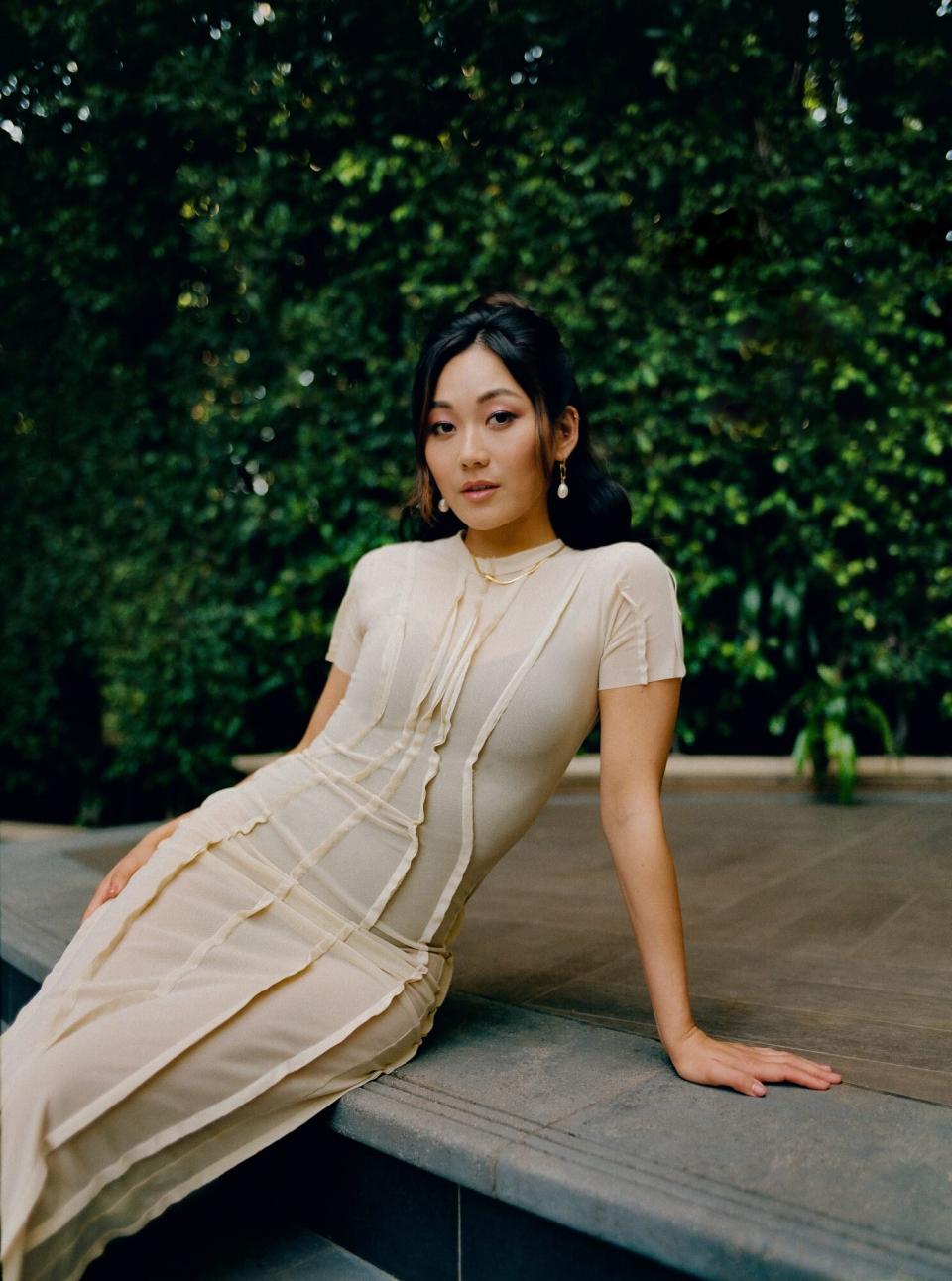Karen Fukuhara Has Always Had a Voice

Photo Credit: Tracy Nguyen
Karen Fukuhara's soft, friendly voice is as jarring as it is welcoming. After watching her for two seasons as Kimiko Miyashiro, a mute super-powered vigilante on Prime Video's The Boys, her soft lilt comes as a pleasant surprise when she logs onto a Zoom call in early June ahead of the series' third season, which premiered on June 3.
The Boys, which debuted in 2019, turns the superhero genre on its head, examining what happens when purported heroes go rogue (often in the goriest ways). In a show full of blood, guts, exploding heads, and a permeating nihilism, there's Fukuhara — oftentimes bloodied, yes, but also deftly infusing Kimiko with a vulnerability that grounds the series and gives it a heart.
"She can be violent and malicious at times — not by choice — but then she also has this really emotional side to her, and I love playing the two dynamics," Fukuhara says.
During the show's first season, The Boys sparked criticism for its portrayal of Kimiko as an Asian woman who doesn't speak at all, prompting showrunner Eric Kripke to later express regret over not having given her more of a voice: "There's the stereotype of a quiet Asian woman, and I was very conscious of not wanting to do that."
Fukuhara, for her part, credits Kripke with adding more dimension to Kimiko than what was written in the source material, The Boys comic books. The first season, as well as the beginning of the second, presented some challenges for the actor, given that the only way she could communicate in character was through gestures. But as the show went on and developed a unique sign language for Kimiko, Fukuhara found it easier to play her.
"Upon reading all of the comic books, I was afraid that she would be one-dimensional," she says. "You don't really get to see her backstory in the comic books, and you don't know why she's doing the things that she's doing and why she's so violent. In our show, from very early on, Eric told me he wants Kimiko to be a normal girl that is put in all of these traumatic circumstances, and to figure out how to play it from there."

Tracy Nguyen
RELATED: Jack Quaid Just Wants to Make You Laugh
For the 30-year-old actress, the show was also a chance to flex some muscles from a previous life. Fukuhara went to UCLA, where she got a degree in sociology, which she says helped her understand that "everything is socially constructed" — including the meaning we put behind superheroes and the power and influence they have on our world.
"It's never been done before, to see superheroes be bad. And our show is truly about what would happen if a group of humans gained the amount of power that superheroes would have, the celebrity, and the political power and influence," she says. "Would they do good or bad?"
The latest season, which reunites cast members Antony Starr, Chace Crawford, Jack Quaid, Karl Urban, Laz Alonso, Jessie T. Usher, and Erin Moriarty alongside newcomer Jensen Ackles, presents more opportunities for this kind of excavation. For Fukuhara in particular, that means she's engaging in everything from action-packed sequences, like fight scenes, to a surreal, out-of-left-field musical number she called "a dream come true."
RELATED: See Our "This Guy" Photo Shoot With Jack Quaid
"I think being Asian, you understand, too, maybe, that there aren't that many opportunities for people that look like us to be onstage," she says. "Things are changing — in the past couple of years, especially, we're making moves. But when I was graduating from high school, I remember my mom told me that I had the choice of going to college or pursuing acting, or joining a theater troupe and doing onstage acting. And I just thought to myself, 'There aren't enough roles out there for me,' especially because I wasn't living in Asia. I was here in America. I just never thought that was a dream that could be fulfilled."
Fukuhara did choose to go to college, and two years after graduating, made her film debut in 2016's Suicide Squad as a samurai warrior Katana, stepping one foot firmly in the superhero universe. A role in the thriller film Stray followed, as well as a string of voice roles, including Netflix's She-Ra and the Princesses of Power, before The Boys catapulted her to superhero fame. With a role in the upcoming Bullet Train alongside Brad Pitt, she's hoping to be a part of a movement of fuller representation for Asians in Hollywood.
"We have had so much underrepresentation and misrepresentation with Asians in Hollywood, and it's time for us to start telling some of our own stories," she says.
Fukuhara, who grew up in Los Angeles with Japanese parents, says she always felt "very half-and-half" when it came to her Asian and American identity, leading her to connect strongly with Asian-American stories. But growing up, she didn't see many actors who she felt really represented her.
"I always got the question, 'Oh, who would play you in a movie?' Or, 'Who do you look up to?' I think, growing up, it was maybe only like Lucy Liu. But to be honest, she looks nothing like me," she laughs. "And although Charlie's Angels is very cool and super badass and funny, and I loved watching it growing up, was that a full representation of me growing up? Probably not. It's exciting to know that there's so much more out there now for Asian youth here in America. And with the streamers all around the world, it's the best when someone comes up to you and says, 'I feel seen, and I feel heard.'"
Offscreen, earlier this year, Fukuhara made people feel heard in a sobering, but no less revolutionary way. In March, she spoke out after being physically attacked during a wave of anti-Asian hate crimes in the U.S., writing in an Instagram post that she was struck in the head by a man while walking to a café. The attack, she said at the time, "came out of nowhere." She wrote that she and the attacker "made no eye contact before," and she "wasn't doing anything out of the ordinary" when it happened.
"By the time I looked back, he was a few feet away from me (he must have kept walking after hitting me)." she wrote, adding that she thought about "confronting" the assaulter but realized it "wasn't worth the risk." Noting that she was "physically fine," she said, "this shit needs to stop. Us women, Asians, and the elderly need your help."
Her post came at a time of heightened anxiety and devastation for Asian Americans. It was a year after a gunman in the Atlanta area opened fire in three salons, killing six Asian women, a massacre that occurred in the midst of a spate of attacks on the Asian community during the coronavirus pandemic. Two months before Fukuhara's attack, Michelle Go, a 40-year-old Asian woman, was pushed to her death on a New York City subway platform. A month later, Christina Yuna Lee, a 35-year-old Asian woman, was followed into her New York City apartment and stabbed to death by a stranger. According to data published by the Center for the Study of Hate and Extremism, anti-Asian hate crime in the U.S. increased by 339% last year compared to the year before.
Fukuhara says that deciding to speak out about her attack was "a guttural reaction."
"I had been reading so many articles about our community just getting attacked out of nowhere, and this was happening in cities like L.A., San Francisco, Oakland, and New York — and these are all cities that we, or I, at least, have felt safe in the past," she says. "So, when that happened, it was almost a cry for help."
That cry for help reverberated during a time when, anecdotally speaking, people seemed to have become desensitized to the countless attacks on Asian Americans. The news about a New York man who, without provocation shoved and elbowed seven Asian women in Manhattan within the span of an hour, hardly made headlines. Hate crimes were still occurring, they just weren't being discussed as widely as they were earlier on in the pandemic. My Asian friends and I were growing tired of trying to make people care about us, trying to make people care that we were being punched 125 times in the head or attacked at a Sam's Club because someone assumed being Asian means being Chinese, and they blamed the pandemic on Chinese people.
"I think, for the longest time, we have spoken about it within our communities, and we go to dinner with our Asian friends, and we're angry, and we're sad," Fukuhara says. "Honestly, I'm fearful for my parents' generation. You can't protect them in every single situation, so it's an important thing for other people to be aware of, because when you're not there, you just hope someone else will have a helping hand. It's not only about helping each other, but also coming to terms with the racism that lies within all of us, probably. Coming to terms with generations of racism, whether it's direct or indirect — I think it's important to face that."

Tracy Nguyen
RELATED: Avantika Says Senior Year Is Not Just Another Teen Movie
When she made her statement, it was like an illusion shattered. Outlets like The Hollywood Reporter, Variety, and Deadline were discussing hate against Asian Americans; my non-Asian friends talked about how "shocked" and "heartbroken" they were that something like this would happen. It was as if seeing headlines about anonymous, nameless people was one thing, and seeing that someone you recognize from TV was attacked was another. A few months after she spoke out, I ask if she thinks things have changed for our community, a question that draws a thoughtful pause.
"I'm not sure what the answer is to that," she finally says. "I haven't looked at numbers lately, so I don't know exactly what has happened. I don't have an answer to that."
Maybe no one does, and maybe it's impossible to quantify whether things have gotten "better" for us. Maybe the only thing we can do is, as Fukuhara says, continue to be vigilant about doing the right thing.
"Moving on, I think it's important for people outside of our community to be aware of it so that maybe we can help each other out," she says. "I would like to hope that if we see anyone in that situation, we would have the courage to stand up for one another, whether that is an Asian person standing up for a Black man or a white woman standing up for an Asian woman. There is power in numbers. I think, hopefully, things are going to change for the better. It's a scary world out there right now in all aspects, not just this topic, so we all need to band together."
Photographs by Tracy Nguyen. Booking by Christopher Luu.